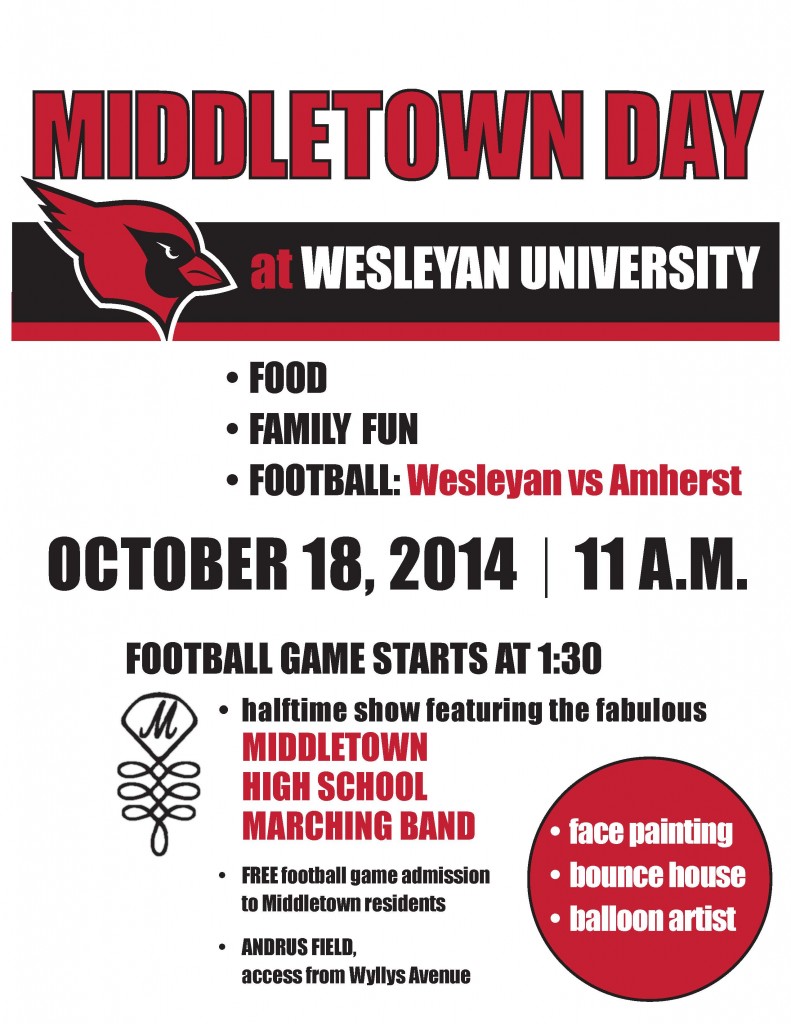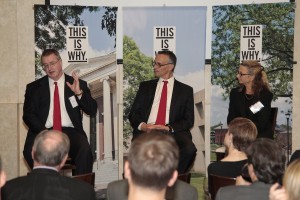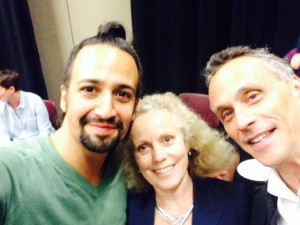There has been a lot of talk in the press recently about the role of athletes in our culture. Here at Wesleyan, about a quarter of our students play a varsity sport, and one shouldn’t make any generalizations about the variety of students who dedicate themselves to excellence in competition. The men’s and women’s tennis teams are off to strong starts, fueled by a combination of new talent and some seasoned players. The women’s volleyball team had a great tournament this weekend and hopes to build on that momentum. Claire Larson ’15 and Heidi Westerman ’17 kept the team humming. Women’s field hockey and soccer have had some tough early losses, but there were plenty of bright spots in their play that will help them keep improving. The men’s soccer team has started strong, and its great goalie Emmett McConnell ’15 has three shutouts in four starts!
One of the really exciting moments last year was the football team winning the Little Three for the first time in over forty years. They also shared the NESCAC crown. On Saturday they begin their season against the always tough Middlebury squad. We wish them luck!
Recently, I reviewed a fine book about football and education by English professor (and former second string linebacker) Mark Edmundson. I cross-post it here with the HuffingtonPost.
Mark Edmundson is a distinguished professor of English at the University of Virginia, the author of many learned essays and important books. He can talk about Freud and Wittgenstein, Homer and Emerson, and he has eloquently written about the importance of teaching and reading. But as he has reflected on the basic elements of his own identity, of his character, he has come to think that it was football “that became the prototype for every endeavor in later life that required lonely, difficult work.” “Football,” he writes “was going to educate me into becoming myself.”
As is the case for so many modern American men, Edmundson’s “education in the game” began by watching it played on television with his dad. Fathers and their kids have often grown closest by joining in an activity that requires little eye contact. Watching those afternoon games together, digesting those expressions of paternal admiration and contempt, this was Sunday school for millions of children. Edmundson beautifully evokes the rituals of smokes, drinks and snacks that went into a workingman’s preparation for the game: “through football my father explained the world to me.”
Halfway through high school Edmundson decided to try to play, curious to see how he would look in the pads, the helmet, the uniform. Taking to the field (twice daily) in August is tough on anybody, and for him it was grueling. Not being much of an athlete, he realized that nobody thought he would survive the training. The low expectations of others fueled his efforts. He couldn’t see much without his glasses, and he couldn’t run too fast even without the heavy pads, but somehow he found a way to build himself – body and spirit – into someone who belonged on the team. In his working class town of Medford, Massachusetts this conveyed some status. More importantly, it provided authentic community.
Edmundson, insightful reader of Freud that he is, is very ambivalent about the nature of this community. On the one hand, it promotes loyalty and courage, discipline and focus. On the other hand, it promotes violence and rage, groupthink and misogyny. Some of the best pages in this book describe the motivations for throwing your body into the fray, of launching yourself into a hit that is bound to hurt. Does it take courage? Sure, but rage also helps.
Edmundson turns to Homer for a comparison. In the Iliad Hector is a great warrior, a man of virtue and courage. He can “turn it off” when the battle is over. Not so Achilles, whose rage spills from war into everything else. It is, of course, Achilles who triumphs over Hector, but rage will exact its toll.
Some football coaches are particularly good at tapping into the passions of the young men in their charge. Locker-room anger at some perceived slight can lead to productive fury on the field. Edmundson discovers how to enrage himself by conjuring up memories of insults and offenses — all those folks who didn’t think he’d ever be able to hold his own. But the most powerful wrath comes from remembering the losses that cut the deepest.
And Mark Edmundson’s family had losses most difficult to bear. His father’s childhood scars of abandonment were profound, and then the family suffered the death of Mark’s little sister, Barbara Ann. Dad drank even more and stayed away from time to time; but he held it together. Mom sank into her grief for long periods, but she, too, found the resources of resilience and faith to carry on. Edmundson cites Freud on the work of mourning, and his folks worked to keep the family together. “How do you get from grief to some kind of gain? …Work lets you mourn the loss and put it behind you.” Edmundson was ostensibly writing about football there, but it may have been even more relevant to his parents. When he went to comfort his mother, she would simply reply: “I’m sad about the baby. There’s nothing you can do.”
There may have been nothing he was able to do at home, but he did learn to build himself through discipline, exercise and practice on the football field. Edmundson found a new brotherhood in his teammates, and they had many lessons to teach one another. He participated with fervor, but he was both in and out of the game, a “semi-outsider.” This status allows him real insight into the group dynamics. The game is certainly brutal at times, but it is also “beautiful and daring”. The loyalty of the young men to one another is often admirable, but “at certain points a bunch of men together can stop being a group and become something like a pack.” “Anyone,” Edmundson writes, “can see they are dangerous.”
And this is what Edmundson wants to emphasize to his readers about football. It’s so risky because the efforts and emotions it conjures up are so real. Playing the game with your teammates requires enormous effort; the work leads you to become better than you had ever been before. The personal losses you bring to the field don’t disappear, but your relationship to them can change. Experiencing that change, that effort to perfect oneself, is transformative. But calling up the resentments and the rage, calling to mind life’s losses to fuel one’s own violent energies is corrosive, too.
Playing a sport like football teaches you how to “summon the beast.” But growing up means learning what to do with those passions after the end of the fourth quarter. Edmundson’s “education in the game” has been so potent because he hasn’t left its lessons on the field.
This book certainly enriches one’s sense of a game that enthralls millions of Americans with its violence and its grace. It also reminds us of how the risks and rewards of athletics can be integrated with an education for life. And so the season begins!
Why Football Matters: My Education in the Game
By Mark Edmundson
Penguin Press: 229 pp., $26.95




![FullSizeRender[1]](https://roth.blogs.wesleyan.edu/files/2014/10/FullSizeRender1-225x300.jpg)
![FullSizeRender[2]](https://roth.blogs.wesleyan.edu/files/2014/10/FullSizeRender2-300x225.jpg)


